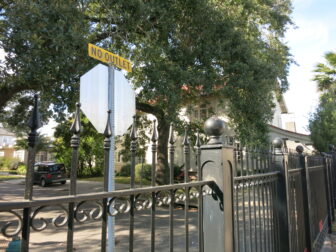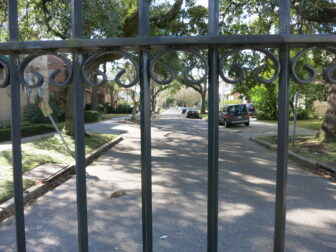Mr. Landrieu, tear down that fence.
That was the ruling of the state Fourth Circuit Court of Appeal on Monday when it ordered the city of New Orleans to remove a fence blocking one end of Newcomb Boulevard in Uptown.
Adam Swensek, an assistant city attorney, said in an email Thursday that he has instructed the city’s Department of Public Works to remove it “without delay.” He estimated “it may take a few days to get the appropriate work orders and crews in place.”

Newcomb Boulevard is a block away from Audubon Place, a gated, private street next to Tulane University. In mid-2006, after complaining to the city about drivers using Newcomb as a cut-through from St. Charles Avenue to Freret Street, the Newcomb Boulevard Association erected an iron fence at Freret.
They did so after a Nagin administration official said they could do so, without a public hearing or City Council approval.
Newcomb has effectively been a cul-de-sac since.
Keith Hardie Jr., an attorney who lives nearby, filed suit in January 2007 contending that only the City Council has the authority to close a city street, and then only after the association had paid for the street. That’s how the city handled a similar case in Broadmoor.
The Fourth Circuit sided with Hardie in a February ruling. But this fall, the city asked for more time to negotiate with the Newcomb Boulevard Association to purchase the street. In 2011, Hardie estimated that could cost the association $500,000. That’s also the value of Audubon Place.
In Monday’s order, the appeals court ruled that there’s no reason to delay and told the city to take the fence down.

“We’ve been fighting this for seven years now,” Hardie said Friday. “We’ve been a bit discouraged that we had to battle the city, which was basically supporting the Newcomb Boulevard Association. They were claiming the street was not closed. That’s not right. It was no longer a thoroughfare.”*
With Monday’s ruling, Hardie said he is “hoping this will relieve some of the congestion on St. Charles.”
Christian Rooney, president of the Newcomb Boulevard Association, expressed disappointment in the ruling.
“The city decision to permit this traffic control device 7 years ago was based on safety concerns, the unique nature of a long narrow street with no cross streets and demonstrated speeding traffic problems,” he said in an email. “We think it was a wise safety decision 7 years ago and are disappointed with this development.”
The association appears to have exhausted its legal remedies. It could ask the City Council to purchase the street, which would require an appraisal and several public hearings.
Reporter Charles Maldonado contributed to this report.
*Correction: This story was updated after publication to correct Hardie’s quotation about the plaintiffs’ argument regarding whether the street was closed.
